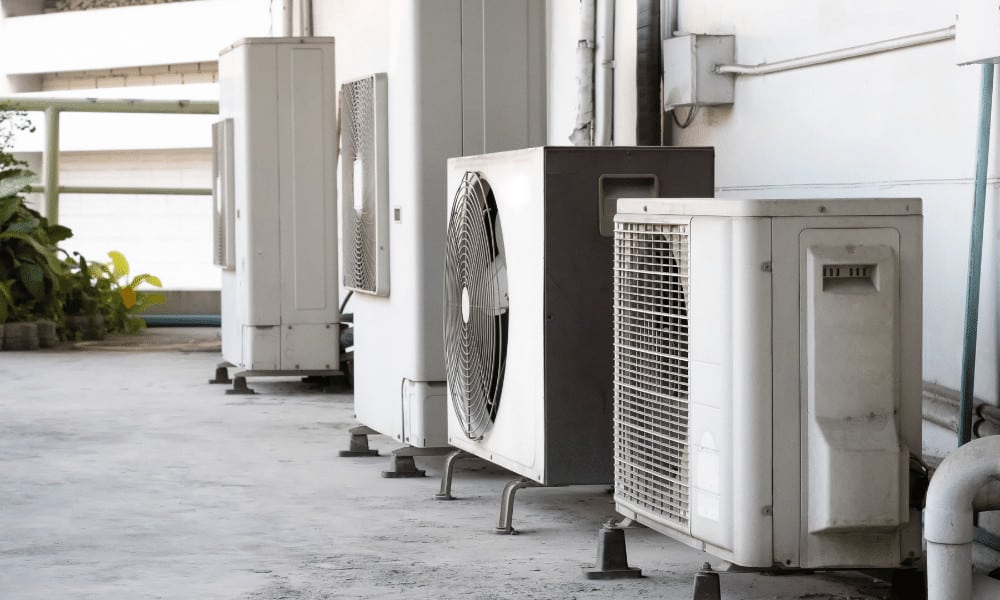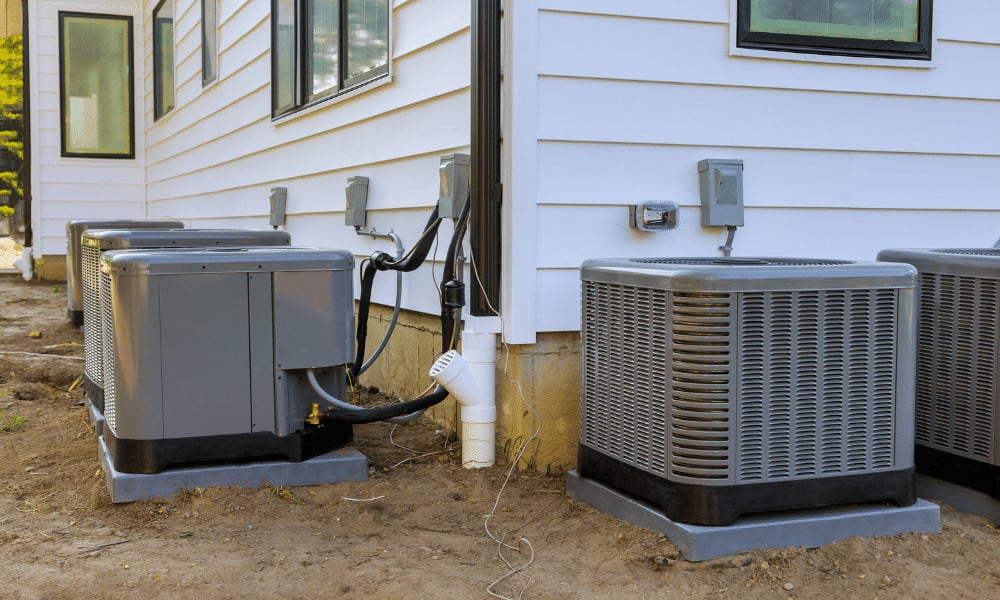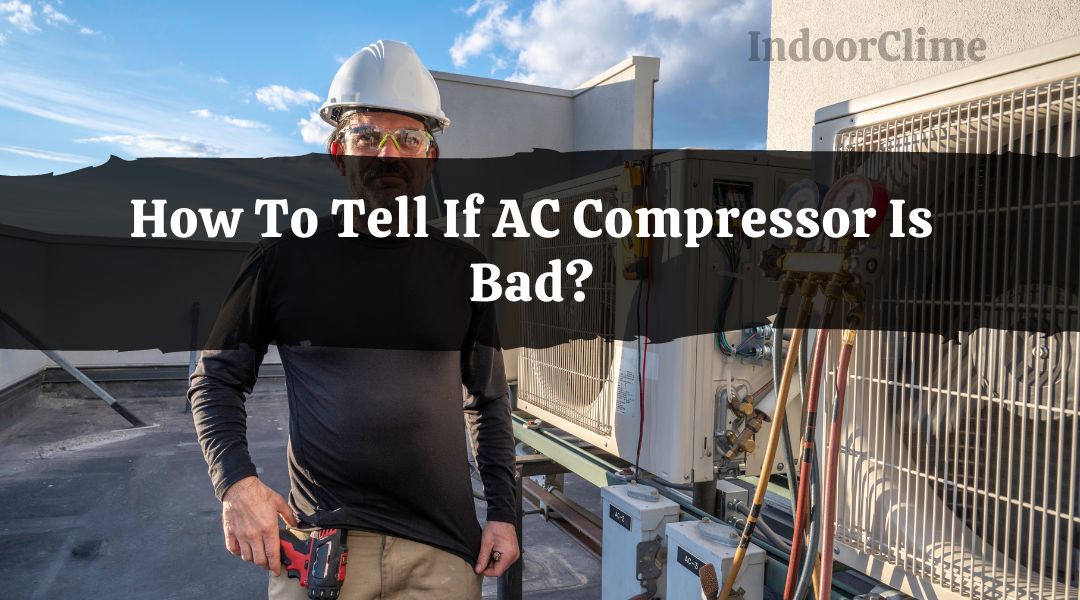Living in a warm climate like California or Florida can be challenging during the summer when temperatures outside are well over 100 degrees Fahrenheit.
Air conditioners have become a necessary appliance to live comfortably indoors. Many people take their air conditioners for granted until they break down, and the homeowner is left sweltering in the heat.
All parts should function for your AC to run smoothly throughout summer, including your AC’s compressor.
A bad AC compressor indicates that your air conditioner will not be able to cool your home as efficiently as possible. It is part of the AC responsible for circulating the refrigerant throughout your AC system.
When the compressor is not working properly, your AC cannot cool air properly and use more energy.
In this blog, we tackle how your AC operates and how to tell if your AC compressor is going bad.
What Is an Air Conditioner Compressor?
Before we jump into the signs that indicate a failing AC compressor, let’s briefly go over how your air conditioner operates.
Your air conditioner has three essential parts: The compressor, condenser, and evaporator. All three work together to cool your home effectively.
The condenser and evaporator act as heat exchangers. The refrigerant circulates between these two units and helps transfer heat from your home’s inside to the outside.
This special fluid type helps transfer heat from your home to the outside air.
The compressor helps circulates the refrigerant in the unit’s system. This part is located between the condenser and the evaporator.
When the refrigerant reaches the compressor, it is in a low-pressure vapor form. The compressor then pumps the refrigerant and raises its pressure and temperature.
The new hot and pressurized refrigerant goes to the condenser, where it releases its heat. The heat is transferred to the outside air, and the refrigerant returns to a low-pressure liquid form.
The now-cooled and liquefied refrigerant goes back to the evaporator, where the cycle starts again.
Why Does an AC Compressor Go Bad?

As you can see, the compressor plays a vital role in the AC system, and a bad compressor can cause your AC to break down.
Common reasons why your air conditioner’s compressor goes bad are:
Lack of maintenance
Like all air conditioner parts, your AC compressor needs regular maintenance.
Over time, the lack of proper maintenance can lead to a build-up of dirt and debris that can cause your compressor to fail.
Electrical problems
The compressor is an electrical component and, as such, is susceptible to electrical problems. A bad capacitor, for example, can cause your compressor to overheat and fail.
Refrigerant leaks
A refrigerant leak can cause your compressor to work harder than it should. The extra strain on the compressor can cause it to overheat and fail.
Dirty coils
Dirty coils can cause your compressor to overheat. The coils should be cleaned regularly for your air conditioner’s maintenance.
Cycling too often
Your AC compressor should cycle on and off to regulate the temperature in your home. If the compressor is cycling too often, it can overheat and fail.
Repairs weren’t done properly.
If you’ve had your AC repaired in the past, and the repairs weren’t done properly, it can cause your compressor to fail.
This is if an inexperienced HVAC technician used the wrong type of refrigerant or made alterations in the AC system that caused it to operate less efficiently.
Can You Run Your AC With a Bad Compressor?

Some homeowners may be tempted to run their AC with a bad compressor, but we advise against it.
A bad compressor puts extra strain on the rest of your air conditioning system and can cause irreparable damage. Damages may include:
Cracked heat exchanger
Your air conditioner unit will have to work harder to cool your home, causing the heat exchanger to crack.
A cracked heat exchanger can release carbon monoxide into your home, harming your health.
Dirty air filter
The extra strain on your system can cause the air filter to get dirty quicker. A dirty air filter can cause your AC to overheat and fail.
Frozen coils
The extra strain on your system can cause the coils to freeze. Frozen coils can lead to a cooling power loss and damage the unit.
Leaks in the system
If your air conditioner has been running with an inefficient compressor, it can cause leaks in the system.
These leaks can be expensive to repair and cause your air conditioner to break down completely.
Burnt-out motors
Damaged compressors lead to extra strain on the motors in the unit. This can cause the motors to overheat and burn out.
A bad compressor will cause your energy bills to skyrocket as your AC system must work overtime to cool your home.
Running your air conditioning unit with a bad compressor is not worth it.
It is always best to get your AC system checked by a professional if you suspect your compressor is bad.
What Are the Signs Of a Bad Air Conditioner Compressor?
Running a damaged air compressor could bring costly repairs.
Here are five signs that indicate a bad AC compressor to avoid this.
The Air Conditioner Is Not Cooling Your Home As Efficiently As It Should Be
If your home is not cooling as efficiently as it should be, it could be a sign of a bad compressor.
The compressor pumps the refrigerant through the system, and if it is not working correctly, it can cause your AC to lose its cooling power.
Strange Noises Coming From the AC Unit
If you hear strange noises coming from your AC unit, it could signify that the compressor is going bad.
The compressor is an electrical component, and as such, it can make strange noises when failing.
The AC Unit Is Leaking
A refrigerant leak can cause your compressor to work harder than it should. The extra strain on the compressor can cause it to overheat and fail.
It Has Undergone Repairs In the Past
Older AC units may have gone through several repairs in the past and have had parts replaced. If these repairs are not done correctly, it can cause the compressor to fail.
Energy Bills Have Increased
A compromised compressor causes the AC system to compensate by working harder. This will lead to increased energy consumption and, in turn, an increase in your energy bills.
Frozen bits outside the unit
The condenser and evaporator coils could have iced over due to the compressor malfunctioning. This can restrict airflow and prevent your AC unit from cooling your home properly.
DIY AC Compressor Troubleshooting
If you suspect that your compressor is going bad, there are a few things that you can do to troubleshoot the issue.
Check to see if the compressor is receiving power. If not, the problem could be with the electrical supply or the compressor itself.
Look into the capacitor. The capacitor is responsible for starting the compressor; if it is not working properly, it can cause the compressor to fail.
A compromised capacitor exhibits signs of bulging or leaking.
Check for signs of wear and tear. If the compressor is old or repaired in the past, it is more likely to fail. Replacing the compressor requires the services of a professional, so it is best to have a professional handle this instead.
Assess the pressure of the refrigerant. If the pressure is too low, it can cause the compressor to overheat and fail. Refrigerants harm the environment, so leaving this task to a professional is best.
Check the refrigerant levels in your AC unit. If the refrigerant is low, it can cause your compressor to overheat and fail.
An AC compressor is a complex piece of machinery, so it is best to leave repairs and replacements to the professionals.
If you suspect your AC compressor is going bad, contact a licensed HVAC technician to check your system.
Are All AC Compressors the Same?

No, AC compressors come in different variations. Different types of compressors are designed for different AC units. The type of compressor you need will depend on the make and model of your AC unit.
If you have a central air conditioning system, the most common is hermetic compressor. This type of compressor is sealed and has no exposed moving parts.
Hermetic compressors are designed with refrigerants with a low boiling point, such as R-134a.
The scroll compressor, which is also known as a spiral compressor, is a type of compressor that uses two scroll plates to compress the refrigerant.
Scroll compressors are more efficient than reciprocating compressors and are less likely to fail.
The reciprocating compressor is the most common compressor used in AC units. It uses a piston to compress the refrigerant.
Reciprocating compressors are less efficient than scroll compressors but more affordable.
The rotary compressor is a type of compressor that uses a rotating shaft to compress the refrigerant.
Rotary compressors are more efficient than reciprocating compressors but are more expensive.
The screw compressor is likely used in various commercial applications. The compressor uses two intermeshing screws to compress the refrigerant.
Screw compressors are more efficient than reciprocating compressors but are more expensive.





